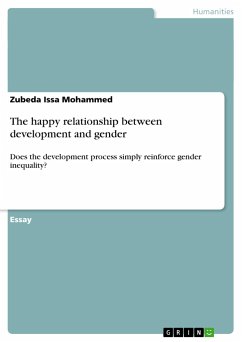
Is the death of feminism imminent?
A radical feminist critique of post-feminism.

PAYBACK Punkte
0 °P sammeln!
Essay from the year 2013 in the subject Gender Studies, grade: 1:0, University of Birmingham, course: International Relations with Political Science, language: English, abstract: Feminism observes and problematizes the fundamentally political relationship between gender and power (Stoker, 2002, p. 129), insisting upon ending sexist exploitation and oppression of women (Hooks, 2000, p. 1). However, post-feminists argue that feminism achieved its goals and is consequently 'dying' (Walby, 2011, p. 2). This essay will argue that the death of feminism is not imminent. Firstly, I will outline Naomi ...
Essay from the year 2013 in the subject Gender Studies, grade: 1:0, University of Birmingham, course: International Relations with Political Science, language: English, abstract: Feminism observes and problematizes the fundamentally political relationship between gender and power (Stoker, 2002, p. 129), insisting upon ending sexist exploitation and oppression of women (Hooks, 2000, p. 1). However, post-feminists argue that feminism achieved its goals and is consequently 'dying' (Walby, 2011, p. 2). This essay will argue that the death of feminism is not imminent. Firstly, I will outline Naomi Wolf's argument that feminism is irrelevant as power is "there for the taking" (Browne, 2001, p. 53) , if women stop viewing themselves as 'victims' (Wood, 2013, p. 86). I will agree with Germaine Greer that such arguments appeal to privileged women who do not understand discrimination (Wood, 2013, p. 87). Secondly, I will argue that post-feminist trends such as "Raunch Culture" attempted to reject feminism as "embarrassingly out of touch" (Stéphanie Genz, 2009, p. 12). Conversely, I will agree with Ariel Levy and Sylvia Walby that such consumerist trends are inequalities re-casted as 'liberating' (Powell, 2010, p. 76). Next, I will agree with Greer that feminism is not redundant, but needed now more than ever (UKFeminista, 2012). Women still face ridicule, objectification and violence (O'Hagan, 2012) despite apparent "emancipation." Therefore, such trends are a danger to feminism as they encourage young women not to challenge the social order and dismiss feminist activism as superfluous (Claudia A. Mitchell, 2008, p. 313). Finally, I will argue that despite "feminist backlash" in the media (Worell, 2002, p. 467), feminist resistance is still alive through groups such as "UK Feminista" (Chafetz, 2006, p. 161). In summary, the essay will argue that 'Power Feminism', 'Raunch Culture' and 'Girl Power' have endangered feminism by declaring themselves as an 'improved' feminist thought (Stéphanie Genz, 2009, p. 12) whilst referring to feminism as 'out of touch' (Stéphanie Genz, 2009, p. 12). Backlash from the media has also threatened feminism by demonizing feminists as 'man-hating dykes' and ignoring its past and present achievements (Worell, 2002, p. 467). However, feminist resistance is still alive and an "unfinished revolution" (Davies, 2011).













